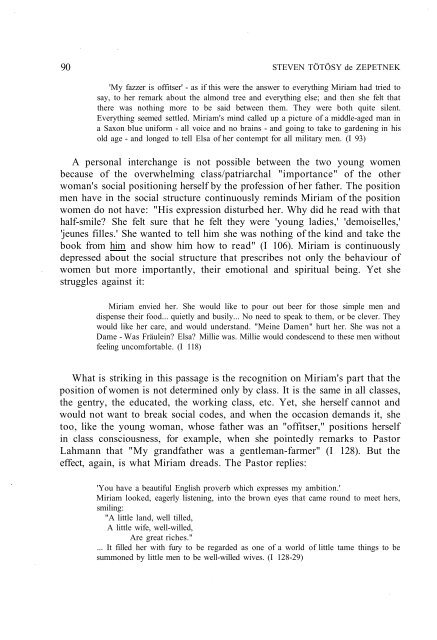90 STEVEN TÖTÖSY de ZEPETNEK'My fazzer is offitser' - as if this were the answer to everything Miriam had tried tosay, to her remark about the almond tree and everything else; and then she felt thatthere was nothing more to be said between them. They were both quite silent.Everything seemed settled. Miriam's mind called up a picture of a middle-aged man ina Saxon blue uniform - all voice and no brains - and going to take to gardening in hisold age - and longed to tell Elsa of her contempt for all military men. (I 93)A personal interchange is not possible between the two young womenbecause of the overwhelming class/patriarchal "importance" of the otherwoman's social positioning herself by the profession of her father. The positionmen have in the social structure continuously reminds Miriam of the positionwomen do not have: "His expression disturbed her. Why did he read with thathalf-smile? She felt sure that he felt they were 'young ladies,' 'demoiselles,''jeunes filles.' She wanted to tell him she was nothing of the kind and take thebook from him and show him how to read" (I 106). Miriam is continuouslydepressed about the social structure that prescribes not only the behaviour ofwomen but more importantly, their emotional and spiritual being. Yet shestruggles against it:Miriam envied her. She would like to pour out beer for those simple men anddispense their food... quietly and busily... <strong>No</strong> need to speak to them, or be clever. Theywould like her care, and would understand. "Meine Damen" hurt her. She was not aDame - Was Fräulein? Elsa? Millie was. Millie would condescend to these men withoutfeeling uncomfortable. (I 118)What is striking in this passage is the recognition on Miriam's part that theposition of women is not determined only by class. It is the same in all classes,the gentry, the educated, the working class, etc. Yet, she herself cannot andwould not want to break social codes, and when the occasion demands it, shetoo, like the young woman, whose father was an "offitser," positions herselfin class consciousness, for example, when she pointedly remarks to PastorLahmann that "My grandfather was a gentleman-farmer" (I 128). But theeffect, again, is what Miriam dreads. The Pastor replies:'You have a beautiful English proverb which expresses my ambition.'Miriam looked, eagerly listening, into the brown eyes that came round to meet hers,smiling:"A little land, well tilled,A little wife, well-willed,Are great riches."... It filled her with fury to be regarded as one of a world of little tame things to besummoned by little men to be well-willed wives. (I 128-29)
MARGIT KAFFKA AND DOROTHY RICHARDSON: A COMPARISON 91Miriam, similarly to Magda Pórtelky, often finds herself drawn to theacceptance, and even desire, of social codes prescribed and exercised bypatriarchy. But both women again and again find the will to truggle againstthese codes and demands. Their rebellion takes many emotional, intellectual,and practical forms. At times, it surfaces that this struggle is possible only bydeviance. Just as Magda's mother advises her (Magda) to "deceive him [herhusband] a little out of love, that is why he is a man" (Színek és évek 117. Seefull quote above), Miriam comes to a similar conclusion: "Men ought not tobe told. They must find it out for themselves. [...] But men liked actresses. Theyliked being fooled" (HI 400).An interesting and curious chauvinistic consciousness also reveals Miriam'sevolution as a feminist woman in the novels. In Pointed Roofs there are severalreferences where Miriam's struggle against patriarchal values manifests itselfin a dislike of the specifically German manifestations of patriarchal codes. So,for example, when she monologuizes about how German men "had alloffended her at once. Something in their bearing and manner... Blind andimpudent..." (I 167), and later she says "She was English and free" (I 180).But this chauvinistic differentiation between German and English will not holdonce she returns to England. There, her struggle against the impositions of thepatriarchy is just as strong as in Germany before. For example, the contemporarymanifestation of the "free" woman, who smokes cigarettes: "She hadchosen to smoke and she was smoking, and the morning world gleamed backat her" (II 210). And in England the German male, with his specific culturalbaggage reveals himself even attractive, as in the figure of Max: "Max mustbe foreign, of course, German - of course. She could, if she liked, talk of thestars to him. He would neither make jokes nor talk science and want her toadmire him, until all the magic was gone. Her mood expanded. He had comejust at the right moment" (II 219. Richardson's italics).The explosion of patriarchal codes is paramount to Miriam and it crosses,significantly, all social and class demarcations: "Of course she had neverrushed about in a common park where rough boys came. At the same time -if the girls wanted to rush about and scream and wear no hats, nobody hadany right to interfere with them" (II 240-41). This example illustrates Miriam'sviews of the struggle to break down the patriarchal system, thus allowing forgender equality. It also shows the built-in weak point: The reality of thedanger of going to the park because of the "rough boys." The struggle againstpatriarchy is thus often limited by both external (social) and personal positions.For example, as in the case of Magda Pórtelky, who is forced into achoice between marriage and the if-not-married-then-a-spinster, Miriam's onlyavenue is her acceptance of and resignation in her position as a teacher. (As
- Page 1 and 2:
Papers of the Radnóti Memorial Con
- Page 3:
HUNGARIAN STUDIESVOLUME 11, 1996 CO
- Page 8 and 9:
6 GEORGE GÖMÖRIprobably Fürst an
- Page 10 and 11:
8 GEORGE GÖMÖRIof the utmost impo
- Page 12 and 13:
10 GEORGE GÖMÖRIén e földön...
- Page 14 and 15:
12 GEORGE GÖMÖRINotes1. Miklós R
- Page 16 and 17:
14 MIHÁLY SZEGEDY-MASZÁKself alwa
- Page 18 and 19:
16 MIHÁLY SZEGEDY-MASZÁKtype is r
- Page 20 and 21:
18 MIHÁLY SZEGEDY-MASZÁKpose, the
- Page 22 and 23:
20 MIHÁLY SZEGEDY-MASZÁK"Wozu Dic
- Page 24 and 25:
22 MIHÁLY SZEGEDY-MASZÁKand Wilme
- Page 26 and 27:
24 MIHÁLY SZEGEDY-MASZÁKbeen the
- Page 28 and 29:
26 MIHÁLY SZEGEDY-MASZÁKBolond, k
- Page 30 and 31:
28 MIHÁLY SZEGEDY-MASZÁK6. Emery
- Page 32 and 33:
30 ZSUZSANNA OZSVÁTHand breaks as
- Page 34 and 35:
32 ZSUZSANNA OZSVÁTHThe drama echo
- Page 36:
34 ZSUZSANNA OZSVÁTHcontinents at
- Page 39 and 40:
FROM CAIN TO NAHUM 37which, as Csap
- Page 41 and 42: \FROM CAIN TO NAHUM 39and bears and
- Page 43 and 44: FROM CAIN TO NAHUM 41who sees what
- Page 45 and 46: FROM CAIN TO NAHUM 438. "A félelme
- Page 47 and 48: HELP ME, PASTORAL MUSE:THE VIRGELIA
- Page 49 and 50: HELP ME, PASTORAL MUSE 47compete! W
- Page 51 and 52: HELP ME, PASTORAL MUSE 49of a priva
- Page 53 and 54: HELP ME, PASTORAL MUSE 51Once again
- Page 55 and 56: HELP ME, PASTORAL MUSE 53Eighth Ecl
- Page 57 and 58: HELP ME, PASTORAL MUSE 55have that
- Page 59: HELP ME, PASTORAL MUSE 57Paul de Ma
- Page 62 and 63: 60 SAMUEL J. WILSONWe did, however,
- Page 64 and 65: 62 SAMUEL J. WILSONbeings and contr
- Page 66 and 67: 64 SAMUEL J. WILSONHungarians would
- Page 68 and 69: 66 SAMUEL J. WILSONthe Austrians. G
- Page 70 and 71: 68 SAMUEL J. WILSONnorth-eastern Zi
- Page 72 and 73: 70 SAMUEL J. WILSONoriginally pursu
- Page 74 and 75: 72 SAMUEL J. WILSONGörgey's decisi
- Page 76 and 77: 74 SAMUEL J. WILSONfrom occurring,
- Page 78 and 79: 76 SAMUEL J. WILSON8. Artúr Görge
- Page 80 and 81: 78 STEVEN TÖTÖSY de ZEPETNEKtört
- Page 82 and 83: 80 STEVEN TÖTÖSY de ZEPETNEKThe c
- Page 84 and 85: 82 STEVEN TÖTÖSY de ZEPETNEKher u
- Page 86 and 87: 84 STEVEN TÖTÖSY de ZEPETNEKthe b
- Page 88 and 89: 86 STEVEN TÖTÖSY de ZEPETNEKrooti
- Page 90 and 91: 88 STEVEN TÖTÖSY de ZEPETNEKcriti
- Page 94 and 95: 92 STEVEN TÖTÖSY de ZEPETNEKshe d
- Page 96 and 97: 94 STEVEN TÖTÖSY de ZEPETNEKNotes
- Page 99 and 100: BERLIN ET PARIS DE LAJOS TIHANYIVAL
- Page 101 and 102: BERLIN ET PARIS DE LAJOS TIHANYI 99
- Page 103 and 104: BERLIN ET PARIS DE LAJOS TIHANYI 10
- Page 105 and 106: BERLIN ET PARIS DE LAJOS TIHANYI 10
- Page 107 and 108: BERLIN ET PARIS DE LAJOS TIHANYI 10
- Page 109 and 110: BERLIN ET PARIS DE LAJOS TIHANYI 10
- Page 111 and 112: BERLIN ET PARIS DE LAJOS TIHANYI 10
- Page 113 and 114: BERLIN ET PARIS DE LAJOS TIHANYI 11
- Page 115: BERLIN ET PARIS DE LAJOS TIHANYI 11
- Page 118 and 119: 116 KEVIN E. KELLYfilms Lugosi made
- Page 120 and 121: 118 KEVIN E. KELLYthe provinces, no
- Page 122 and 123: 120 KEVIN E. KELLYWith his brief an
- Page 124 and 125: 122 KEVIN E. KELLYboth his and Dean
- Page 126 and 127: 124 KEVIN E. KELLYfollowed it into
- Page 128 and 129: 126 KEVIN E. KELLYvampiric nobleman
- Page 130 and 131: 128 KEVIN E. KELLYThe film also boo
- Page 132 and 133: 130 KEVIN E. KELLYWood remained one
- Page 134 and 135: 132 KEVIN E. KELLYLugosi, convinced
- Page 136 and 137: 134 KEVIN E. KELLY19. Lennig, 112-1
- Page 139 and 140: THE AGON OF IRONY AND SATIREIN GYÖ
- Page 141 and 142: THE AGON OF IRONY AND SATIRE 139poe
- Page 143 and 144:
THE AGON OF IRONY AND SATIRE 141tra
- Page 145 and 146:
THE AGON OF IRONY AND SATIRE 143fek
- Page 147 and 148:
THE AGON OF IRONY AND SATIRE 145ner
- Page 149 and 150:
THE AGON OF IRONY AND SATIRE 147whi
- Page 151 and 152:
THE AGON OF IRONY AND SATIRE 149mov
- Page 153 and 154:
THE AGON OF IRONY AND SATIRE 151for
- Page 155 and 156:
THE AGON OF IRONY AND SATIREA harma
- Page 157 and 158:
MURDER IN THE MOUNTAINSTranslated b
- Page 159 and 160:
MURDER IN THE MOUNTAINS 157"Afraid?
- Page 161 and 162:
MURDER IN THE MOUNTAINS 159Abády,
- Page 163 and 164:
MURDER IN THE MOUNTAINS 161"The mar
- Page 165 and 166:
MURDER IN THE MOUNTAINS 163Bálint
- Page 167 and 168:
MURDER IN THE MOUNTAINS 165"That is
- Page 169 and 170:
MURDER IN THE MOUNTAINS 167at hand,
- Page 171 and 172:
CONTRIBUTORSMiklós BÁNFFYLászló
















